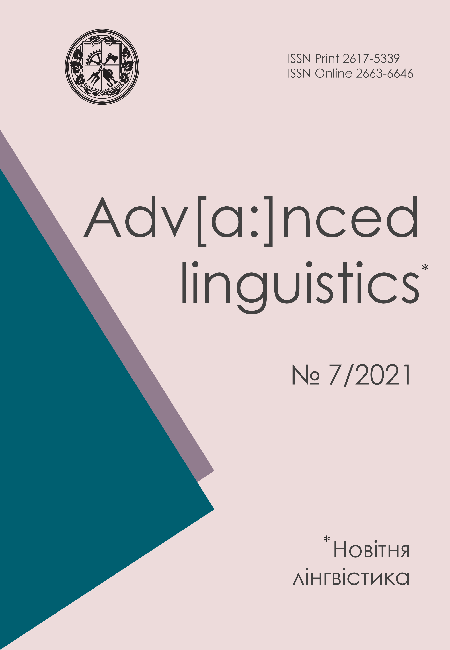Вплив передвищої підготовчої освіти в Туреччині на ефективне творення студентами англомовних електронних листів-запитів.
DOI:
https://doi.org/10.20535/2617-5339.2021.7.222550Ключові слова:
Linguistics, Applied Linguistics, English Language TeachingАнотація
Наголошено, що протягом останніх років міжкультурна та міжмовна прагматика зосереджувалась на дослідженні мовних актів рідною та іноземною мовами, і лише невелику кількість досліджень було спрямовано на вивчення впливу передвищої підготовчої освіти на ефективне продукування мовних актів іноземною мовою, зокрема англійською. Щоб подолати цей розрив, дослідження ставило за мету вивчити ступені вільності та кількість лексичних / фразових внутрішніх і зовнішніх модифікацій в англомовних електронних листах-запитах, що використовувалися 25 студентами кафедри англійської мови та літератури, які пройшли курс підготовчого навчання, та 25 студентами тієї ж кафедри без підготовчої освіти в державному університеті Думлупінар у Кютах’ї. Результати показали, що студенти без підготовчого класу використовували більше умовно непрямі стратегії та внутнрішні модифікації у написанні англомовних електронних листів-запитів, ніж студенти з групи з передвищою підготовчою освітою.
Ключові слова: навчальні електронні листи; електронні листи-запити; прямі та непрямі стратегії; турецькі студенти, які вивчають англійську мову; передвища підготовча освіта.
Посилання
Biesenbach-Lucas, S. (2006). Making requests in e-mail: do cyber-consultations entail directness? Toward conventions in a new medium. In: K. Bardovi-Harlig, J.C. Felix Brasdefer, A. Omar (Eds.), Pragmatics and Language Learning (pp. 81–107). National Foreign Language Resource Center, University of Hawaii Press, Honolulu, HI,.
Blum-Kulka, S., House, J., & Kasper, G. (Eds.). (1989). Cross-cultural Pragmatics: Requests and Apologies. Ablex, Norwood, NJ.
Brown, P., & Levinson, S. (1978). Universals in language usage: Politeness phenomena. In E. Goody (Ed.), Questions and politeness: Strategies in social interaction (pp. 56-310). Cambridge: Cambridge University Press.
Chen, C. E. (2006). The development of e-mail literacy: from writing to peers to writing to authority figures. Language Learning and Technology, 10 (2), 35–55.
Collot, M. & Belmore, N. (1996). Electronic language: a new variety of English. In S. Herring (Ed.), Computer Mediated Communication: Linguistic, Social, and Cross-cultural Perspectives (pp. 13–28). John Benjamins: Philadelphia,.
Creswell, J.W. (2005). Educational research: Planning, conducting, and evaluating quantitative and qualitative research. Upper Saddle River, NJ: Pearson
Crystal, D. (2001). Language and the Internet. Cambridge University press: Cambridge.
Biesenbach-Lucas, Sigrun, 2007. Students writing e-mails to faculty: an examination of e-politeness among native and non-native speakers of English. Language Learning and Technology 11 (2), 59–81.
Economidou- Kogetsidis, M. (2011). ‚Please answer me as soon as possible‛: Pragmatic failure in non-native speakers’ e-mail requests to faculty. Journal of Pragmatics, 43, 3193-3215.
Faerch, Claus, Kasper, Gabriele, 1989. Internal and external modification in interlanguage request realization. In: Blum-Kulka, S., House, J., Kasper, G. (Eds.), Cross-cultural Pragmatics: Requests and Apologies. Ablex, Norwood, N.J., pp. 221–247.
Hardford, B. S. & Bardovi-Harlig, K. (1996). At your earliest convenience’’: a study of written student requests to faculty. In: L. Bouton (Ed.), Pragmatics and Language Learning (pp. 55–69). Urbana-Campaign: University of Illinois.
Hassall, Tim, 2001. Modifying requests in a second language. International Review of Applied Linguistics (IRAL) 39, 259–283.
Li, R., Raja Suleiman, R. and Sazalie, A. (2015). An Investigation into Chinese EFL Learners‟ Pragmatic Competence. GEMA Online Journal of Language Studies, 15(2), 101-118.
Ortactepe, D. (2012). The development of conceptual socialization in international students: A language socialization perspective on conceptual fluency and social identity (advances in pragmatics and discourse analysis). Cambridge: Cambridge Scholars Publishing.
Otcu, Bahar, and Deniz Zeyrek. "Development of requests: A study on Turkish learners of English." Developing contrastive pragmatics: Interlanguage and cross-cultural perspectives(2008): 265-299.
Ölmezer-Öztürk, E. (2017). Requestive E-Mails Of Turkish Efl Learners: A Comparison With Native Speakers Of English And Native Speakers Of Turkish. Zenodo. https://doi.org/10.5281/zenodo.1012564
Shim, Y.-S. (2013). Requests in Stuedent-to-Professor Emails of Korean EFL Students. English Language and Linguistics, 171-194.
Şanal, M. (2016). Conceptual socialization in EFL contexts: a case study on Turkish EFL learners‟ request speech acts realization (Doctoral dissertation, Bilkent University).
Taguchi, N. (2012). Context, individual differences and pragmatic competence. Bristol: Multilingual Matters
##submission.downloads##
Опубліковано
Номер
Розділ
Ліцензія
Наше видання використовує положення про авторські права CREATIVE COMMONS для журналів відкритого доступу.
Автори, які публікуються у цьому журналі, погоджуються з наступними умовами:
1. Автори залишають за собою право на авторство своєї роботи та передають журналу право першої публікації цієї роботи на умовах ліцензії Creative Commons Attribution License, котра дозволяє іншим особам вільно розповсюджувати опубліковану роботу з обов'язковим посиланням на авторів оригінальної роботи та першу публікацію роботи у цьому журналі.
2. Автори мають право укладати самостійні додаткові угоди щодо неексклюзивного розповсюдження роботи у тому вигляді, в якому вона була опублікована цим журналом (наприклад, розміщувати роботу в електронному сховищі установи або публікувати у складі монографії), за умови збереження посилання на першу публікацію роботи у цьому журналі.

